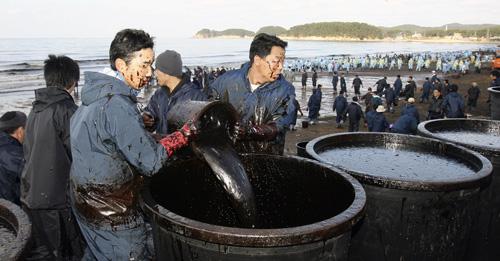Oil spill devastates South Korea’s west coast

Local residents dump dense crude oil retrieved from a beach into a big jar in Mallipo, South Korea, Sunday. The oil slick, which resulted from an accident between a barge and a supertanker Friday, began hitting the shore early Saturday, coming in waves of Bak Sung-ryul, The Associated Press
Dec 10, 2007
Last updated on May 12, 2016 at 07:33 p.m.
MALLIPO BEACH, South Korea – Thousands of people mobilized by South Korea’s Coast Guard used shovels and buckets Sunday to clean up a disastrous oil spill polluting a swathe of the country’s scenic and environmentally rich western coast.
About 100 ships, including Coast Guard, navy and private fishing boats, were also to help contain and clean up South Korea’s worst spill, said Coast Guard official Kim Young-hwan.
At total of 7,500 police, military, civil servants and volunteers struggled to remove the oil, some battling headaches, dizziness and nausea.
The oil started hitting beaches Saturday, a day after a Hong Kong-registered supertanker was slammed by a South Korean-owned barge that came unmoored from its tugboat in rough seas about seven miles off Mallipo, one of South Korea’s best-known beaches. The area also includes a national maritime park.
Get The Daily Illini in your inbox!
On Saturday, tides of dark sea water crashed ashore at Mallipo beach, while the odor reached areas a half-mile away.
Kim Sun-seon, who works for an ocean clean-up business on South Korea’s southeast coast, wore rubber gloves and a mask to cope with the strong smell.
“We don’t know when we can finish this work,” she said. “We have been shoveling oil since yesterday but the waves just keep bringing more oil. I feel dizzy.”
Nearly 2.8 million gallons of crude gushed into the ocean, more than twice as much as in South Korea’s worst previous spill in 1995.
Thick, smelly waves of crude washed ashore, turning seagulls black and threatening fish farms along an 11-mile stretch of coast, defying efforts to contain it by dropping oil fences into the ocean and using chemicals to break it up. Mats were placed on the beach to absorb the oil.
The Coast Guard said the last of three leaks in the tanker had been plugged Sunday morning.
Mallipo, an important stopover for migrating birds including snipe, mallards and great crested grebes, also has an abundant fishing industry.
Choi Kyung-hwan, a 58-year-old fisherman, came to the beach Sunday to help, but despaired for the area where he has lived for 30 years.
“Mallipo is finished,” he said.
Choi, wearing a thick winter coat, said the strong odor of oil had sickened his wife.
“But I came here because I have to do something,” he said. “I don’t know when we can finish. But we have to continue.”
Cho Yoo-soon, who runs a raw fish restaurant at Mallipo beach, 95 miles southwest of Seoul, said the situation was overwhelming. She said restaurants in the area were closing, and she could not pump fresh sea water into her tanks.
“Without fresh sea water, the fish will start going bad after a week,” she said.
The affected areas include 181 maritime farms that produce abalone, brown seaweed, laver, littleneck clams and sea cucumbers, said Lee Seung-yop, an official with the Taean county government, which includes the beach. Aquatic farmers in the area number about 4,000, he said.
“A lot of damage is feared to these farms, although we don’t have an estimate yet,” Lee said Saturday.
Local raw fish restaurants such as Lee Ok-hwa’s were suffering.
“I haven’t had any customers since news of the oil spill Friday,” said Lee, who had previously served 200 tourists and others a day.
The central government has designated the oil spill a “disaster,” which makes it easier for regional governments to mobilize personnel, equipment and material to cope with the situation. But it stopped short of declaring the region a “disaster area,” which would make residents eligible for government financial aid.
Last year, more than 20 million tourists visited the area, home to 63,800 people. The Coast Guard said it was unclear how many days the clean-up would take.
Associated Press writers Kwang-tae Kim and Jae-soon Chang in Seoul contributed to this report





